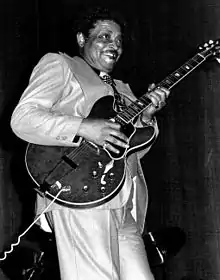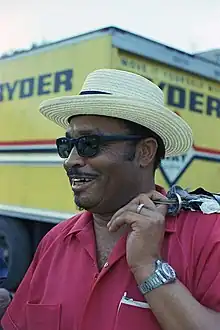Lowell Fulson
Lowell Fulson (March 31, 1921 – March 7, 1999)[1] was an American blues guitarist and songwriter, in the West Coast blues tradition. He also recorded for contractual reasons as Lowell Fullsom and Lowell Fulsom. After T-Bone Walker, he was the most important figure in West Coast blues in the 1940s and 1950s.[2][3]
Lowell Fulson | |
|---|---|
 Performing in Paris in 1980 | |
| Background information | |
| Born | March 31, 1921 Atoka, Oklahoma, U.S. |
| Died | March 7, 1999 (aged 77) Long Beach, California |
| Genres | |
| Occupation(s) |
|
| Instrument(s) | Guitar |
| Years active | 1940s–1999 |
| Labels | |
Early life
Fulson was born on a Choctaw reservation in Atoka, Oklahoma, to Mamie and Martin Fulson. He stated that he was of Cherokee ancestry through his father but also claimed Choctaw ancestry. His father was killed when Lowell was a child, and a few years later, he moved with his mother and brothers to live in Clarita and attended school at Coalgate.[4]
Career
At the age of eighteen, he moved to Ada, Oklahoma, and joined Alger "Texas" Alexander for a few months in 1940,[1] but later moved to California, where he formed a band which soon included a young Ray Charles and the tenor saxophone player Stanley Turrentine. Fulson was drafted in 1943 and served in the U.S. Navy until 1945.[1]

Fulson recorded for Swing Time Records in the 1940s, Chess Records (on the Checker label) in the 1950s, Kent Records in the 1960s, and Rounder Records (on Bullseye Blues) in the 1980s/1990s. He wrote "3 O'Clock Blues" (B.B. King's first hit), "Reconsider Baby" (a blues standard), and "Tramp" (co-written with Jimmy McCracklin and recorded by several artists). His 1965 song "Black Nights" was his first hit in a decade, and "Tramp" did even better, restoring him to R&B stardom.[1] In 1966 his brother Robert Fulson married former member of The Raelettes Margie Hendrix and they both started performing live with Lowell before they divorced in 1968.
A show entitled California Blues: Swingtime Tribute opened in 1993 at the Paramount Theatre in Oakland, California, with Fulson, Johnny Otis, Charles Brown, Jay McShann, Jimmy Witherspoon, Jimmy McCracklin and Earl Brown.[5] Fulson's last recording was a duet of "Every Day I Have the Blues" with Jimmy Rogers on the latter's 1999 Atlantic Records release, The Jimmy Rogers All-Stars: Blues, Blues, Blues.
Death
Fulson died in Long Beach, California, on March 7, 1999, at the age of 77. His companion, Tina Mayfield said that the causes of death were complications from kidney disease, diabetes, and congestive heart failure. He was the father of four and grandfather of thirteen. Fulson was interred in Inglewood Park Cemetery, in Inglewood, California.
Awards and recognition
- 1993: Induction into the Blues Foundation Hall of Fame
- 1993: Blues Foundation Hall of Fame, Classics of Blues Recording – Singles or Album Tracks, for "Reconsider Baby"
- 1993: Blues Foundation Blues Music Award, Traditional Album of the Year, for Hold On
- 1993: Rhythm and Blues Foundation, Pioneer Award
- 1995: Grammy Awards, nomination as Best Traditional Blues Album of the Year, for Them Update Blues
- 1995: Rock and Roll Hall of Fame, "Reconsider Baby" included in the "500 Songs That Shaped Rock and Roll"
- 2010: Blues Foundation Hall of Fame, Classics of Blues Recording – Albums, for Hung Down Head
Partial discography
Charting singles
| Year | Title | Label | R&B
Chart no. |
|---|---|---|---|
| 1948 | "Three O'Clock Blues" | Down Town | 6 |
| 1949 | "Come Back Baby" | Downbeat | 13 |
| 1950 | "Everyday I Have the Blues" | Swing Time | 3 |
| "Blue Shadows" | 1 | ||
| "Lonesome Christmas (I & II)" | 7 | ||
| "Low Society Blues" | 8 | ||
| 1951 | "I'm a Night Owl (I & II)" | 10 | |
| 1954 | "Reconsider Baby" | Checker | 3 |
| 1955 | "Loving You" | 14 | |
| 1965 | "Black Nights" | Kent | 11 |
| 1967 | "Tramp" | 5 | |
| "Make a Little Love" | 20 | ||
| "I'm a Drifter" | 38 | ||
| 1976 | "Do You Love Me" | Granite | 78 |
Selected albums
| Year | Title | Label |
|---|---|---|
| 1959 | Back Home Blues | Night Train Int'l |
| 1962 | Lowell Fulson | Arhoolie |
| 1965 | Soul | Kent |
| 1967 | Tramp | |
| 1969 | Now | |
| In a Heavy Bag | Jewel | |
| 1970 | Hung Down Head | Chess |
| 1971 | Let's Go Get Stoned | Kent |
| 1973 | I've Got the Blues | Jewel |
| 1975 | Lowell Fulson (Early Recordings) | Arhoolie |
| Ol' Blues Singer | Granite | |
| 1976 | Lowell Fulson (Chess Blues Masters) | Chess |
| 1984 | Everyday I Have the Blues | Night Train Int'l |
| One More Blues | Black & Blue | |
| 1988 | San Francisco Blues | Black Lion |
| It's a Good Day | Rounder | |
| 1992 | Hold On | Bullseye Blues/Rounder |
| 1995 | Sinner's Prayer | Night Train Int'l |
| Them Update Blues | Bullseye Blues/Rounder | |
| 1996 | Mean Old Lonesome Blues | Night Train Int'l |
| 1997 | The Complete Chess Masters (50th Anniversary Collection) | Chess/MCA |
| 2001 | I've Got the Blues (... and Then Some) (complete Jewel recordings) | Westside [UK] |
| 2002 | The Complete Kent Recordings 1964–1968 | P-Vine |
| 2004 | 1946–1953, Vols. 1–4 (complete Big Town, Downbeat/Swing Time recordings) | JSP |
With John Lee Hooker
- I Feel Good! (Carson, 1970; Jewel, 1971)
- I Wanna Dance All Night (America, 1970)
References
- "Lowell Fulson | Biography & History". AllMusic.
- Russell, Tony (1997). The Blues: From Robert Johnson to Robert Cray. Dubai: Carlton Books. pp. 112–13. ISBN 1-85868-255-X.
- "Lowell Fulson obituary". The Guardian. 12 March 1999. Retrieved May 11, 2019.
- Eagle, Bob; LeBlanc, Eric S. (2013). Blues: A Regional Experience. Santa Barbara, California: Praeger. p. 60. ISBN 978-0313344237.
- Elwood, Philip (October 27, 1995). "Witherspoon still serving up the blues". Sfgate.com.
- Whitburn, Joel (1988). "Lowell Fulson". Top R&B Singles 1942–1988. Menomonee Falls, Wisconsin: Record Research. p. 141. ISBN 0-89820-068-7.
- "Lowell Fulson – Discography". AllMusic. Retrieved May 2, 2010.